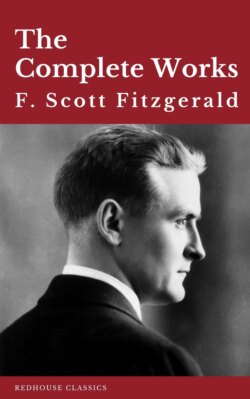Читать книгу The Complete Works of F. Scott Fitzgerald - F. Scott Fitzgerald - Страница 41
На сайте Литреса книга снята с продажи.
Incident of the Wonderful Girl.
ОглавлениеThere was a bright star in February. New York burst upon him on Washington’s Birthday with the brilliance of a long-anticipated event. His glimpse of it as a vivid whiteness against a deep-blue sky had left a picture of splendor that rivalled the dream cities in the Arabian Nights; but this time he saw it by electric light, and romance gleamed from the chariot-race sign on Broadway and from the women’s eyes at the Astor, where he and young Paskert from St. Regis’ had dinner. When they walked down the aisle of the theatre, greeted by the nervous twanging and discord of untuned violins and the sensuous, heavy fragrance of paint and powder, he moved in a sphere of epicurean delight. Everything enchanted him. The play was “The Little Millionaire,” with George M. Cohan, and there was one stunning young brunette who made him sit with brimming eyes in the ecstasy of watching her dance.
“Oh—you—wonderful girl,
What a wonderful girl you are—”
sang the tenor, and Amory agreed silently, but passionately.
“All—your—wonderful words
Thrill me through——”
The violins swelled and quavered on the last notes, the girl sank to a crumpled butterfly on the stage, a great burst of clapping filled the house. Oh, to fall in love like that, to the languorous magic melody of such a tune!
The last scene was laid on a roof-garden, and the ’cellos sighed to the musical moon, while light adventure and facile froth-like comedy flitted back and forth in the calcium. Amory was on fire to be an habitué of roof-gardens, to meet a girl who should look like that—better, that very girl; whose hair would be drenched with golden moonlight, while at his elbow sparkling wine was poured by an unintelligible waiter. When the curtain fell for the last time he gave such a long sigh that the people in front of him twisted around and stared and said loud enough for him to hear:
“What a remarkable-looking boy!”
This took his mind off the play, and he wondered if he really did seem handsome to the population of New York.
Paskert and he walked in silence toward their hotel. The former was the first to speak. His uncertain fifteen-year-old voice broke in in a melancholy strain on Amory’s musings:
“I’d marry that girl to-night.”
There was no need to ask what girl he referred to.
“I’d be proud to take her home and introduce her to my people,” continued Paskert.
Amory was distinctly impressed. He wished he had said it instead of Paskert. It sounded so mature.
“I wonder about actresses; are they all pretty bad?”
“No, sir, not by a darn sight,” said the worldly youth with emphasis, “and I know that girl’s as good as gold. I can tell.”
They wandered on, mixing in the Broadway crowd, dreaming on the music that eddied out of the cafés. New faces flashed on and off like myriad lights, pale or rouged faces, tired, yet sustained by a weary excitement. Amory watched them in fascination. He was planning his life. He was going to live in New York, and be known at every restaurant and café, wearing a dress-suit from early evening to early morning, sleeping away the dull hours of the forenoon.
“Yes, sir, I’d marry that girl to-night!”
